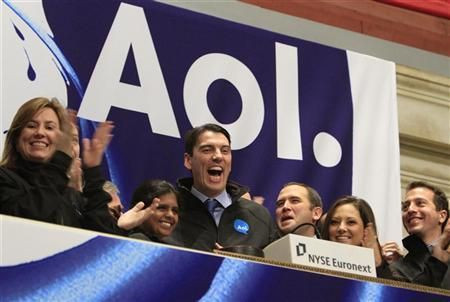NSA/PRISM Scandal: Government Can’t Fight Terrorism Out In The Open, Says AOL CEO Tim Armstrong

Since the news of sweeping NSA surveillance broke, many media types have been quick to jump on the “spying is always bad” bandwagon. But Tim Armstrong, chairman and chief officer of AOL Inc. (NYSE:AOL), thinks the discussion needs more nuance.
At a “Media Minds” breakfast discussion in Midtown Manhattan Thursday, Armstrong opened up about his feelings on the precarious balance between personal privacy and the government’s need to collect information, secretly, as a means of protecting its citizens.
Moderator Alex Jones -- not the popular conspiracy-monger Alex Jones, but the sober former New York Timesman and director of the Joan Shorenstein Center on the Press, Politics and Public Policy -- asked Armstrong if he is concerned by revelations that the NSA is tapping into vast numbers of computer data and phone records. Armstrong answered with an anecdote about the school trips he used to take to the site of the Battle of Concord, which kicked off the Revolutionary War in 1775. During those trips, he said, his teacher would retell how colonial Americans killed a number of British Redcoats by hiding behind trees and surprising them when they marched into the middle of the open field to wait for battle. Armstrong said the story would always perplex him as a kid.
“Every year, I used to raise my hand and say, well, why did the Redcoats march in the middle of the field?” Armstrong said. “They’d tell me, ‘That’s the way things were done.’ There was an agreement that you’d march on the field, they’d march on the field, and everyone would shoot each other directly on.”
Extending the analogy, Armstrong said the methods of 18th-century warfare can teach us a lot about what it takes to stay one step ahead of those who would do us harm today.
“What you see today is the terrorist organizations, they’re standing behind trees,” he said. “And if you’re the head of one of the government agencies, trying to protect your citizens, and our laws say you have to have to go stand in the middle of the field, there are a lot of tension points around that.”
According to the Guardian, AOL is one of the tech giants whose data is tapped into by the U.S. government’s PRISM program. Like Facebook Inc. (NASDAQ:FB), Google Inc. (NASDAQ:GOOG) and others, however, AOL released a statement denying any knowledge of the program.
“We do not have any knowledge of the PRISM program. We do not disclose user information to government agencies without a court order, subpoena or formal legal process, nor do we provide any government agency with access to our servers.”
Jones, a former New York Times reporter who won a Pulitzer Prize in 1987, did not press further into AOL’s connection to PRISM. However, he did ask Armstrong about the company’s increasingly aggressive push into data collection. AOL, like any tech giant, collects massive amounts of user information for marketing and advertising purposes. Jones called such information a “great, great power” that could just as easily be used for evil as it could for selling the latest face cream.
Susan Lyne, the chief officer of AOL’s Brand Group, who was also on the panel, said data collection is simply a fact of life in modern media. The question, she said, is not about whether or not tech companies should collect user data, but what they can do to ensure that data is protected.
“Once something is possible, you don’t get to put it back inside a box,” she said.
Despite the media uproar that NSA surveillance has caused, polls show that the majority of Americans think surveillance is acceptable as long as it is keeping us safe. According to a recent Pew Research survey, 62 percent of Americans think the federal government should be allowed to investigate possible terrorist threats, even if those investigations infringe on personal privacy.
Armstrong said that, whether we like it or not, there are a lot of “tension points” in the world revolving around efforts to obtain -- and protect -- information, and the question of balance between privacy and security is not going to be solved overnight.
“I think that’s a big discussion that’s going to take a long time to continue,” he said.
Got a news tip? Send me an email. Follow me on Twitter: @christopherzara
© Copyright IBTimes 2025. All rights reserved.






















